By LISA EISENHAUER
As Our Lady of Sorrows Church in New York City was preparing this fall to restart its program of offering the sacrament of Holy Communion to the homebound, its pastor was aware that many of those parishioners had been isolated for the better part of two years.
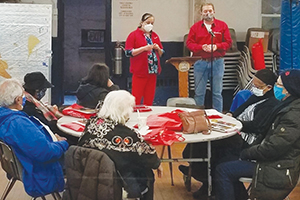
Ebelise Andujar and Michael Helck of ArchCare Managed Long Term Care program give Eucharistic ministers at Our Lady of Sorrows Church in New York City advice on how to spot potential need when bringing Holy Communion to those who are homebound.
With that in mind, he invited ArchCare, the continuing care community of the Archdiocese of New York, to train the church's Eucharistic ministers to spot signs of need as they resumed home visits in the Roman Catholic parish's racially and economically diverse section of lower Manhattan. The visits had been on hold since the start of the COVID-19 pandemic.
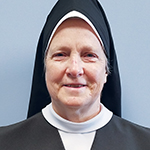
Sr. Dennehy
"Those Eucharistic ministers, their priority is bringing the Eucharist to the person," says Sr. Mary Anne Dennehy, O CARM, a registered nurse and ArchCare's parish outreach representative. "But in that encounter, they may assess the fact that the person has a medical or a nursing need that isn't met."
Sr. Dennehy and four others from the agency set up a two-hour training session on Nov. 6at the church. It drew about 30 Eucharistic ministers.
"I was so impressed that these people came out on a Saturday afternoon and with their dedication to what they are doing," Sr. Dennehy says. "That made me want to do more and more for that parish."
Serving as 'eyes and ears'
Damaris Saliva, one of the Eucharistic ministers who took part in the training, says she thinks it prepared her well to become "the eyes and ears" for the parish as she visits fellow congregants who can't leave their homes or who are isolating while COVID remains a threat.
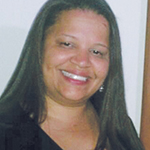
Saliva
"I think it's a wonderful idea that this is happening," says Saliva, the church's coordinator of religious education for parents. "It goes beyond just bringing the body of Christ. It's about caring more about the person."
Ministers who see unmet needs on their visits are going to pass their observations on to group leaders among the ministers or the church's pastor, says Fr. Thomas McNamara, OFM Cap., who will contact ArchCare.
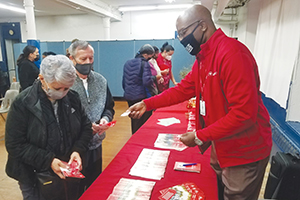
Robert Anderson from ArchCare's Program of All-Inclusive Care for the Elderly hands out information about the program to parishioners between services at Our Lady of Sorrows Church in New York City.
Sr. Dennehy explains, "and we can get the proper people in there to do an evaluation."
As part of the training, the ArchCare instructors shared information on services the agency offers including at-home care and its Program of All-Inclusive Care for the Elderly, PACE. The services are available at different levels among the 10 counties in the archdiocese, including in the section of Manhattan where Our Lady of Sorrows is located.
Organizers of Our Lady of Sorrows' Eucharistic ministry were assessing requests for Holy Communion visits and figuring out assignments in mid-November. Sr. Dennehy already had gotten one referral regarding a parishioner. She was working with Catholic Charities to arrange assistance.
Do's and don'ts
The training session at Our Lady of Sorrows was the first for ArchCare since the pandemic put many church outreach programs on hold and forced health care providers to alter their practices to stem the virus' spread.
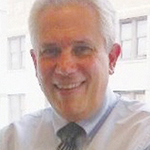
Guglielmo
The training of Eucharistic minsters to watch for signs of concern at homes they visited was initiated by Michael Helck, vice president of ArchCare Community Life. Michael Guglielmo, the agency's director of parish integration, says it condensed the training it did at Our Lady of Sorrows from material that it had used pre-pandemic at events for Eucharistic ministers or pastoral visitors from multiple parishes. ArchCare revised the material with COVID protocols in mind.
The training material includes a list of things for the ministers to look and listen for during their home visits, such as any significant changes from the last visit and complaints of pain. The session also covered do's and don'ts for the visits. The do's include giving the parishioner a chance to express himself or herself and showing compassion.
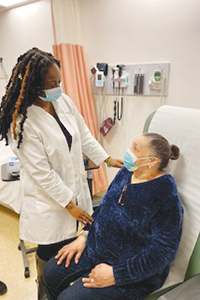
Maleka Sanderson, a nurse practitioner, greets Norma Reyas in the clinic at the ArchCare Senior Life Harlem PACE Center in New York. The Program of All-Inclusive Care for the Elderly is one of many that ArchCare offers within the Archdiocese of New York.
ArchCare provided the training and handouts for the ministers in English and Spanish, the first language of many of Our Lady of Sorrows' parishioners.
The trainers gave their audience time to ask questions. Saliva asked why the ministers should connect their fellow parishioners with ArchCare, as opposed to other health care agencies. She says she was happy with Guglielmo's answer that not only is ArchCare a Catholic agency but that its focus is on seeing that the elderly in the archdiocese get appropriate care.
"The people we can help with our services at ArchCare are many times the people we don't see because they're not out in the community," Guglielmo says. "But we know that our good Eucharistic ministers and pastoral visitors of the sick are seeing these folks."
Sr. Dennehy says another minister mentioned having seen, on past visits to homes, health care aides watching television or doing other things generally not in keeping with their work. The minister wanted to know what to do in such cases.
Sr. Dennehy says the question reflected how observant the ministers are when visiting homes. It also gave the ArchCare trainers the opportunity to advise the volunteers to be aware not only of their fellow parishioners' safety but also of privacy issues and confidentiality when they are in a home.
"The Eucharistic ministers really can't do it all — they can't solve all the problems — but we just wanted to let them know that there are resources available to help them," she says. "So, if they felt that that person was being neglected or not properly cared for, they should definitely report something like that to someone who could look into it."
Keep in touch
While the Eucharistic minister training at Our Lady of Sorrows was a one-day event, the partnership between the church and ArchCare will continue. "Probably in January we're going to come back to the parish and do a check-in and say, 'What other training is needed? What else do you need? What did you find out?' and then keep that going," Guglielmo says.
The day after the training session, ArchCare staffers returned to Our Lady of Sorrows to visit with parishioners who attended the Sunday Masses. They set up an information table with brochures about the agency's services and offered blood pressure and glucose screenings, advising those whose results were concerning.
The visit was ArchCare's first step toward resuming such in-person outreach efforts, which had been sidelined by the pandemic. "It really is a great opportunity to do some one-to-one and give people some good insight into their own health without making any prognosis," Guglielmo explains.
Given the reception the ArchCare team got at Our Lady of Sorrows, Guglielmo and Sr. Dennehy are looking ahead to working with other parishes as pandemic protocols ease.
"Our parish integration program has always been to say: What are your needs? How can we help you?" Guglielmo says.
ArchCare shares guidance for home visits
ArchCare, the long-term care system for the Archdiocese of New York, developed these tips as part of its training for Eucharistic ministers and other parish visitors who are returning to homes as pandemic protocols ease.
The goal of the training is to help the ministers spot potential needs among the homebound and report their observations to others who can help connect those parishioners to services.
What to look for/note when making a home visit
- Any significant changes from last visit
- Difficulties in walking and self-care
- Does the person have the appropriate medical equipment
- Changes in ability to communicate or increased forgetfulness
- Complaints of pain
- Feelings of isolation or despair
- Obvious weight loss with no food in the house
- How does the home look and smell
- Any loss in support from family, friends or community
- Any difficulty in traveling to medical appointments
- Any recent hospitalizations or emergency room visits
- Any difficulty managing or obtaining medications
How to be during a visit
Do
- Be confident in your ministry, be yourself
- Be observant, notice need
- Be aware of cultural differences
- Assure confidentiality
- Allow the person time to express him/herself
- Show compassion
- Allow and affirm venting
- Offer support, empathy and a peaceful presence
- Share the Gospel
- Reach out to others in the home when appropriate for information on the homebound communicant
Don't
- Argue, or take sides
- Try to fix the situation
- Interject your unwanted opinions
- Play the counselor
- Have preconceived notions of the person or situation
- Be nosey
- Be overly reserved
- Visit if you are not feeling well